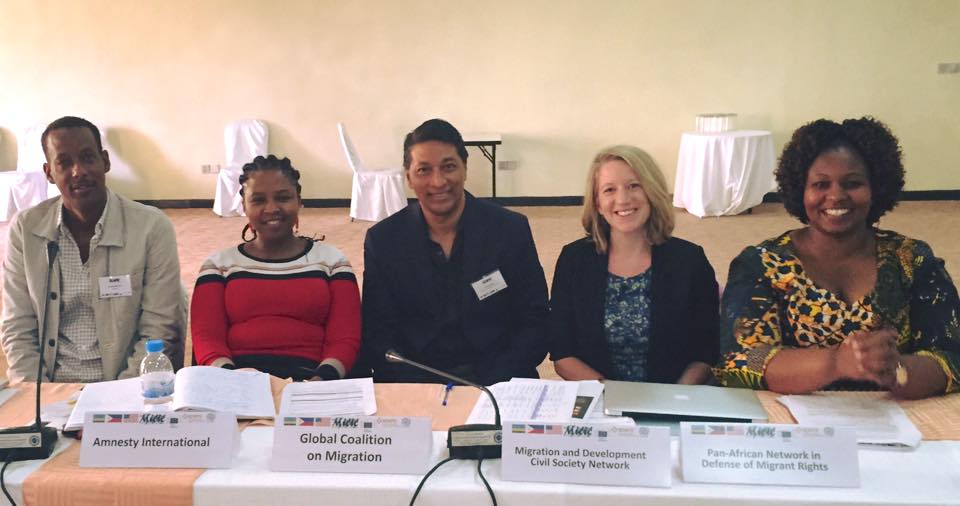10 May 2016

The sixth and final civil society Migrants in Countries in Crisis (MICIC) regional consultation took place in Nairobi, Kenya on April 29, four days before the state consultations in Kigali, Rwanda, on 3-4 May. The focuses for the consultations were the sub-regions of East and Southern Africa.
MADE, in collaboration with the Global Coalition on Migration (GCM) and the Pan-African Network in Defence of Migrant Rights (PANiDMR), organized the civil society regional consultation. The participants included NGOs, Trade Unions, and migrant associations, coming from countries across these two sub-regions such as Ethiopia, South Africa, Kenya, Uganda, Somalia and Djibouti. MICIC Initiative co-organisers - International Organisation for Migration (IOM) and the International Centre for Migration Policy Development (ICMPD) - also took part.
The civil society consultation provided a briefing and orientation on the MICIC Initiative, with the main objective being to deliberate on the MICIC with a view to making input into the ongoing process of developing Non-Binding Guidelines for states/governments on the protection mechanisms for migrants during times of crisis.
Sicel’mpilo Shange-Buthane, Executive Director of Amnesty International South Africa, delivered the key messages of regional civil society to the government MICIC consultation in her capacity as civil society rapporteur. 47 state representatives were present, as well as regional and international organisations including IOM, UNHCR and OCHA. In response to the presentation, Michelle Prodromou from the US Mission Office for Humanitarian Affairs in Geneva commented that throughout the six regional consultations, “civil society has always given constructive recommendations while also pushing us to take responsibility more widely.”
Civil society participation was rich in this MICIC regional consultation. MADE Advocacy and Communication Officer Emer Groarke, who also represented civil society at the government consultation, was invited to act as rapporteur for the Working Group on Unaccompanied and Separated Migrant Children, while Milka Isinta of PANiDMR gave an Expert Presentation on Assisting Migrant Women during Emergencies, guiding the subsequent Working Group on the subject. Other civil society participants in the government-led consultation included GCM, Save the Children Rwanda and Cordaid Kenya.
The MICIC Initiative is a state-led initiative launched in 2014 at the Global Forum on Migration and Development (GFMD) in Stockholm, Sweden. Led by the U.S. and Philippines governments, the aim of this initiative is to improve the ability of states and other relevant stakeholders to prepare for, respond to and alleviate suffering, and protect the dignity and rights of migrants caught in countries in situations of acute crisis. The UN Secretary General has recently released a report leading up to the UN General Assembly High Level Meeting (HLM) on Large Movements of Refugees and Migrants, in which he has called on states to “give favourable consideration to incorporating the insights into national policies and practices, of the State-led Migrants in Countries in Crisis Initiative to protect and assist migrants caught in countries experiencing conflicts or natural disasters”. Director of the IOM MICIC Secretariat, Michele Klein Solomon, indicated that the possibility of utilising MICIC as a way to enhance protection for migrants in general - aside from migrants in countries in crisis - will be explored at the HLM, which will take place on September 19 of this year.
Read the key messages of civil society to the MICIC Regional Consultation for East and Southern Africa here
Read more on civil society participation in the MICIC Initiative here
Read more on the State-led MICIC Initiative here
Sign up for more information on MICIC and other MADE activities here